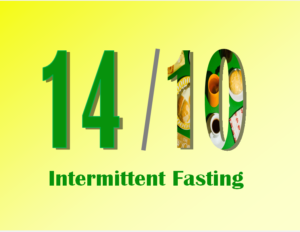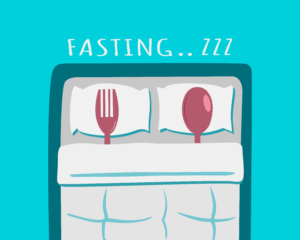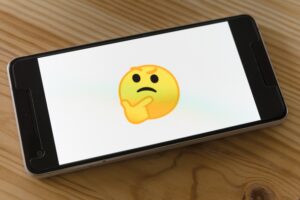Myth vs Fact? Everybody agrees that intermittent fasting is a great lifestyle choice.
That is 100% a myth! How do I know? Because I have discovered (just like you have) that everyone has an opinion. The majority of people who’ve done their research agree it’s a great practice for most people. But for those who aren’t as familiar with intermittent fasting, it’s all over the place. And they are not afraid at all to express their misgivings about intermittent fasting. And to be fair, even the intermittent fasting experts (doctors and scientists) sometimes disagree on small issues, but not about fasting in general.
The uninformed buzz about intermittent fasting
So today we’re going to talk about some of the common things you may hear from well-meaning loved ones when you tell them you’re intermittent fasting. I have my own collection, but in order to get a well-rounded sampling, I reached out to the Intermittent Fasting for Women Facebook group. And I asked them to share the some of the comments and questions they hear from other people about intermittent fasting.
I’ve been part of this group of 135,000+ women for over three years and they never fail to provide great advice and a lot of fun. And as usual, they came through. 🙂
I do want to note that I got a lot of responses related to the concerns people had about eating disorders and the potential for starvation. So many, in fact, that I decided to save those for another blog. But for now, it is important to acknowledge that intermittent fasting is not healthy for everyone.
Experts agree the following individuals should not be intermittent fasting: women who are pregnant (or planning to become pregnant) or breastfeeding; anyone under the age of 18; those with a history of disordered eating; and anyone with a medical condition, especially diabetes. Intermittent Fasting might also interfere with certain medications.
With that in mind, let’s proceed with the results.
1. “My sisters-in-law told me I would lose all my muscle…
They were doing this special diet at the time where they cooked all these specific strange foods at specific times. That was over three years ago. They no longer have that lifestyle. And my muscle went up.” L.A.J.
Myth vs fact:
With any weight loss program you can expect to lose some muscle. Especially low calorie diets that lead to rapid weight loss. Intermittent fasting doesn’t have a specific eating plan. And most fasting experts do not recommend low-calorie meals during your eating window. You can eat whatever you want and as much as you want and still enjoy at least some of the benefits of fasting. Of course if you’re hoping to lose weight, you can’t see it as a license to eat to excess.
Make sure you are losing mostly fat…
That said, no matter how you are eating, it’s always smart to make sure that your food selection is not leading to unhealthy muscle loss. When you see that number on the scale go down, it’s normal to be excited and maybe even increase your efforts. But the truth of the matter is, sometimes you are losing more muscle than fat. And that’s a problem! Because it’s the muscles that keep you strong and burn a lot of the fat. So if you end up losing a bunch of muscle, you’ve now got less muscle to burn most of the fat you wanted to lose.
To make sure you are losing mostly fat and not muscle, I recommend a smart scale. A smart scale tells you exactly how much of your weight loss is fat and how much is muscle. It allows you to play around with what foods you can eat during your eating window to burn fat. The scale I recommend is the arboleaf Smart Scale. You just step on the scale, and all of the metrics upload to your app. So you can track how much of your current weight is fat, muscle, water, bone, etc. It’s been a game changer for me. Especially after I did a low calorie diet for a week and realized 2/3 of the weight I lost was muscle.
I also recommend the smart measuring tape. It guides you through measuring each of the body parts. You just loop the tape around the body part, lock it in, and upload the measurement to the same app. No contorting around to see the number! The app tracks your results and you can see the inches melting off before you even notice changes in your clothes. It’s a lot of fun and very encouraging. I highly recommend the arboleaf Smart Scale and Measuring Tape!

Women Who Fast is a participant in the Amazon Services LLC Associate Program. This means we receive a small commission if you purchase through our links AT NO EXTRA COST TO YOU! Thank you for using our links.
2. “I was told by someone that I could not have coffee at all while fasting…
And that the cortisol levels would ruin my fast. Then I ask her what she drinks in the mornings as non-diet person and she drinks coffee creamer. (How does that make sense?)…” L.S.
Myth vs Fact:
This is 100% a myth according to every single expert I’m learned from. Drinking coffee while fasting is absolutely fine; the controversy comes in if you start adding cream, sugar, and sweeteners to it. Many experts believe that anything that tastes sweet or has calories in it may break your fast. We’ll talk a little bit more about the cortisol next.
3. “But breakfast is the most important meal of the day.” N.B.M.
And we also heard “You should be eating in the morning.” G.V.S.
Myth vs Fact:
According to Medical News Today (and numerous other resources I found), there is no conclusive evidence to suggest that breakfast is the most important meal of the day.
That said, Dr. Annette Bosworth (Dr. Boz) actually suggests opening your eating window first thing in the morning if your morning fasting glucose levels are over 100. As a result, the fasting window closes earlier in the day providing the body more time to burn through those sugars before the morning cortisol drop. (This explains what L.S. mentioned above.) Dr. Boz explains all of this in this short “High Morning Blood Sugars” YouTube video.
So if you’re like me, you may be wondering how to know what your morning glucose levels are. After watching the Dr. Boz video and others like it, I went out and bought a blood glucose level meter. However, after buying it I realized the meter is only one piece of the system. (Rookie mistake!) In addition to the meter, you need test strips, lancets (and lancing device), and control solution. So I had to purchase a couple more things to have everything I needed.
To save you the hassle of multiple purchases, I’ve done some research on Amazon and found what I would have bought had I known more. The Metene TD-4116 kit has everything you need to start testing (except alcohol pads). Plus, the kit is inexpensive and gets high reviews on Amazon and has videos to help you get started. One suggestion: Walk through the steps and do a practice run when you’re wide awake. Then you can do it bleary-eyed the next morning to get your morning fasting glucose level.
Before you buy: Are you doing keto too?
After buying my glucose monitor I continued watching Dr. Boz videos and discovered the Keto Mojo Blood Glucose & Ketone monitoring system. Dr. Boz recommends doing both so you can work towards getting your readings coordinated to maximize autophagy. I realized with only one finger prick, I could monitor my glucose level and the level of ketones in my blood at the same time. Check out the videos to see how easy it is to use. Plus, it comes with an app to allow you to monitor your progress.
This kit comes with ten glucose test strips and ten ketone test strips. So when you need to stock up, here’s a link to order more strips for this specific meter.
Trying to lose weight and improve my health has turned into my own personal science project. I can now monitor if I’m losing fat instead of muscle and see exactly where my body is slimming down. I can check to see if my glucose levels are improving, therefore decreasing my risk of diabetes. And even better, I can check my glucose and ketone levels immediately after I eat something to see how it impacted me. Now I can make informed decisions literally on an hourly basis to optimize the time I’m putting towards becoming healthier.
4. “….What does your doctor say?” B.S.
So this isn’t really a myth vs fact, but you will hear this a lot. And the truth of the matter is that it all depends on your doctor. Some doctors are highly supportive of intermittent fasting. But other doctors just aren’t. And of course as we discussed earlier, there are some people who should NOT be intermittent fasting.
The truth of the matter is that people have been intermittent fasting since the beginning. Our ancestors didn’t always have food readily available, so sometimes they were forced to go periods of time without eating. Hippocrates, often referred to as the father of modern medicine, recommended fasting. And Benjamin Franklin even wrote in the 1700’s that “the best of all medicines is resting and fasting.” (Check out Intermittent Fasting and Sleep for more on this.)
Plus, when you think about it, we have all been intermittent fasting since the day we were born. Because we are all practicing intermittent fasting when we sleep at night!
But that said, I would never advise you to go against your doctor’s medical advice. If you would like to try fasting and you don’t have any medical conditions to worry about, perhaps there is a compromise. Maybe you and your doctor could come up with a starting plan that can be monitored on a regular basis to make sure fasting isn’t adversely affecting you.
Experts agree that intermittent fasting is not for everyone. Please read our Terms of Use.
5. “Isn’t it better to eat small meals?” J.A.S.
The inference behind this question usually comes from people who are convinced it’s better to eat 3-5 small meals and snacks throughout the day rather than eating normal size meals within a fasting window.
Myth vs Fact:
6. “Is this a religious thing?” K.M.
The implication here is that people only fast for religious reasons.
Myth vs Fact:
This one is a mixed bag. Many world religions since the beginning of time have included fasting in their teachings. The intent is to sacrifice eating for a certain period of time and use food cravings and hunger pains as prompts to pray and worship. Little did they know (until just recently), while they were worshipping in this manner, their bodies were receiving all kinds of physical benefits (blessings!) from this practice.
On the other hand, people fast all the time for reasons other than religion. Whether it’s before a medical test or in an effort to slim down and get healthier, there are a myriad of non-religious reasons why people fast.
Myth vs Fact: Conclusion
I received so many great responses to my question; thank you so much to my Intermittent Fasting for Women Facebook group. I wish I could have used them all.
People are often times skeptical about things they don’t understand. And that’s okay! It prompts a lot of great discussions. I think C.H.B. from the group sums it up beautifully and I will conclude with her response:
“Our bodies don’t need to eat all day long and yet we have been told we do. Our bodies actually suffer if we eat all day long and yet no one teaches us abstinence of any kind. This knowledge has changed my life in the most wonderful way and I would share it with whomever was interested, but frankly most people aren’t. I would just smile knowingly to myself and not worry about what they think.” C.H.B.
Happy Fasting ladies! – Kim


















